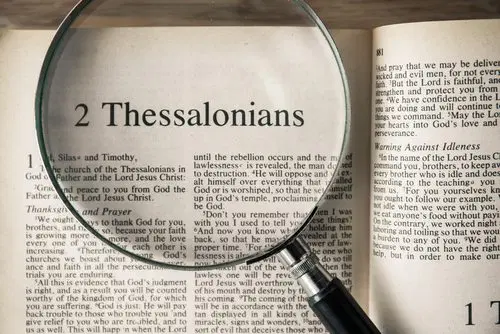Introduction
Why isn’t the church in thessalonica mentioned in rev. 2-3:The Book of Revelation, written by the Apostle John, includes messages to seven specific churches in Asia Minor (modern-day Turkey) in chapters 2 and 3. These messages are addressed to the churches of Ephesus, Smyrna, Pergamum, Thyatira, Sardis, Philadelphia, and Laodicea. However, one church that played a significant role in the early Christian movement is notably absent—the church in Thessalonica. Why isn’t it mentioned alongside the other churches? This article explores the potential reasons behind this omission and the broader implications it may have.
Historical Context of the Thessalonian Church
The church in Thessalonica was founded during the Apostle Paul’s second missionary journey, as documented in Acts 17. Thessalonica, a key city in Macedonia, was a vital center for trade and politics in the Roman Empire. Because of its strategic location, Thessalonica was an influential city for spreading the gospel in the first century.
Paul wrote two letters to the church in Thessalonica, now known as 1 Thessalonians and 2 Thessalonians, which focus on themes such as faith, endurance under persecution, and the hope of Christ’s return. Given the church’s importance, it is intriguing that it wasn’t included in the letters to the churches in Revelation.
The Churches Mentioned in Revelation 2-3
The churches addressed in Revelation 2-3 are all located in Asia Minor. These seven churches—Ephesus, Smyrna, Pergamum, Thyatira, Sardis, Philadelphia, and Laodicea—were part of a larger Roman province known as Asia. Each church received specific messages from Christ, ranging from encouragement to correction, depending on their spiritual condition.
These churches were not the only Christian communities in the early church, but they were chosen for their strategic locations and the particular spiritual issues they faced, which made their situations representative of broader spiritual conditions in the early church.
Why Isn’t the Church in Thessalonica Mentioned?
One possible reason for the omission of Thessalonica is its geographical location. While the churches mentioned in Revelation were located in Asia Minor, Thessalonica was situated in Macedonia, which was part of a different Roman province. The book of Revelation, therefore, may have been focused specifically on the churches in Asia, without addressing those in other regions.
Additionally, the message in Revelation was likely tailored to the cultural and spiritual circumstances of the churches in Asia Minor. These churches were under significant pressure from Roman authorities, pagan religions, and internal struggles, making them particularly important for the message of Revelation.
Was the Church in Thessalonica Not Important Enough?
It’s unlikely that the Thessalonian church was excluded from Revelation because it wasn’t important. Thessalonica was one of the most influential cities in early Christianity, and Paul’s letters to the Thessalonians are filled with praise for their steadfastness in faith.
Instead, the church’s absence from Revelation may have been due to the regional focus of the messages, rather than any commentary on the church’s spiritual state or significance. The Thessalonian church’s exclusion may reflect the fact that the book of Revelation had a particular message for the seven churches in Asia Minor, rather than an all-encompassing list of all Christian communities at the time.
Different Regions, Different Purposes
The letters to the seven churches in Revelation were meant for specific audiences in Asia Minor, while Paul’s letters to the Thessalonians were directed at believers in Macedonia. The spiritual challenges faced by the churches in these regions may have been different, which could explain why they received different kinds of instruction. While the churches in Asia Minor were facing issues such as false teachings and persecution, the church in Thessalonica may have been dealing with different challenges.
The Purpose of the Letters in Revelation
The letters in Revelation 2-3 were not simply random selections; they were carefully chosen to address issues that were emblematic of the spiritual conditions of many churches during that time. Christ’s messages to these seven churches focus on issues like perseverance, faithfulness, repentance, and overcoming worldly pressures. These letters served as both encouragement and warning, not just to the churches in Asia Minor but to the entire body of Christ.
Paul’s Relationship with the Thessalonians
Paul’s letters to the Thessalonians show a deep personal connection with this church. Unlike the more corrective tone in some of his letters to other churches, Paul’s messages to the Thessalonians were filled with encouragement, hope, and praise for their faithfulness under persecution. Paul’s focus was on building endurance and preparing the Thessalonians for Christ’s return. This contrasts with the focus of John’s letters in Revelation, which were more centered on the spiritual condition of churches in Asia Minor.
What Can We Learn from the Missing Church of Thessalonica?
The absence of the Thessalonian church in Revelation doesn’t diminish its importance. Instead, it serves as a reminder that not all churches were mentioned, but all played a vital role in the spread of the gospel. For modern believers, this is an important lesson in humility and faithfulness. Just because a church isn’t mentioned in scripture doesn’t mean it was insignificant in the grand scheme of God’s plan.
The Broader Scope of God’s Plan in Revelation
The seven churches in Revelation are representative of the types of challenges faced by the broader Christian community. The message of Revelation applies to all believers, even if their specific church wasn’t named. Thessalonica, like many other early churches, played a crucial role in spreading Christianity, and its exclusion from Revelation doesn’t negate its importance in God’s overarching plan.
What Does the Absence of Thessalonica Teach Us About the Church Today?
For the church today, the absence of Thessalonica in Revelation is a reminder that not every church is highlighted, but every church is important. Modern churches can still take lessons from both the Thessalonian church and the churches in Revelation, learning about endurance, faithfulness, and the spiritual vigilance needed to overcome challenges.

Leave a Reply